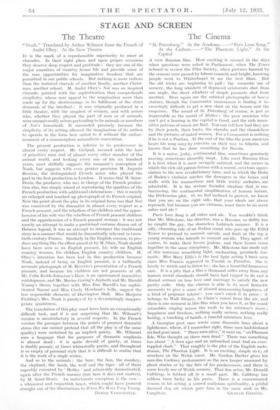The Cinema
"St. Petersburg." At the Academy. "Paris Love Song."
At the Carlton.—" The Phantom Light." At the Capitol
A NEW Russian film. How exciting it seemed in the days when questions were asked in Parliament, when The Times refused to review the Film Society, when pictures banned by the censors were passed by labour councils and bright, knowing people went to Whitechapel to see the best films. But the old tricks are beginning to pall : the romantic use of
scenery, the long whiskers of depraved aristocrats shot from one angle, the short whiskers of simple peasants shot from another, Here again are the satirical photographs of heavy statues, though the Communist cameraman is finding it in- creasingly difficult to get a new slant on the horses and the emperors. The moral of St. Petersburg, of course, is just as impeccable as the moral of Mother : the poor musician who can't get a hearing in the capital is Good, and the rich insen- sitive patrons of music are Bad. You can tell how bad they are by their jewels, their busts, the cherubs and the chandeliers and the pictures of naked women. For a Communist is nothing if he is not a Puritan. At the end of the film the poor musician hears his song sung by convicts on their way to Siberia, and knows that lie has done something for Russia.
It is a naive, jerky, sentimental film, sometimes genuinely moving, sometimes absurdly inept. Like most Russian films it is best when it is most savagely satirical, and the scenes in which the rich old patron listens with a seared, covetous appre- ciation to the new revolutionary tune, and in which the Duke of Baden's violinist catches the dowagers in the boxes and
stalls with his mannerisms and little tricky melodies, are admirable. It is the serious Socialist idealism that .is em- barrassing, the sentimental simplification of human nature, the Dickensian plot. 0, we feel inclined to protest, we know that you are on the right side, that your ideals are above reproach, but because you are virtuous, must there be no more cakes and ale ?
Paris Love Song is all cakes and ale. You wouldn't think that Mr. Milestone, the director, was a Russian, so deftly has he caught the gay, the shameless Lubitsch manner. It is a silly, charming tale of an Italian count who goes up the Eiffel Tower to pretend to commit suicide, and finds at the top a young woman who intends to commit suicide. They agree, of course, to make their lOvers jealous, and their lovers come together in the same Ciinspiracy. Mr. Milestone has made out of this nonsense something light, enchanting, genuinely fan- tastic. Miss Mary Ellis's is the best light acting I have seen since Miss Francis appeared in Trouble in Paradise. She is lovely to watch and to listen to ; she has a beautiful humorouS ease. It is a pity that a film a thousand Miles away from any hunian moral standards should have had tagged to its end a dismal Sermon on true love and marriage to satisfy the new
purity. code. Only the cinema is able in its most fantastic moments to give a sense of absurd unreasoning happiness, of
a kind of poignant release : you Can't catch it in prose : it
belongs to Walt 'Disney, to Claire'S voices froin the air, and there is one moment in this film when you have it, as the count
scrambles singing across the roofs to his Mistress's room happiness and freedom, nothing really serious, nothing really lasting, a touching of hands, a tuneful miniature love.'
A Georgian poet once wrote some dramatic lines about a lighthouse, where, if I remember right, three men had died and
six had gone mad. " Three men alive," it went on, " on Flannan Isle, Who thought on three men dead." There was something too about " A door ajar and an untouched meal And an over toppled chair." That roughly is the plot of the English melo- drama, The Phantom Light. It is an exciting, simple stcry of wreckers on the Welsh coast. Mr. Gordon Harker gives his sur&fire.Cockney performance as the new keeper unsaved by ghost Stories or by the fate of his predecessors, and. there is , some lovely use of Welsh scenery. That fine actor, Mr. Donald Calthrop, is fobbed off in a small part. Mr. Calthrop has seldom been, lucky in his parts. There is a concentrated venom' in his acting, a soured malicious spirituality, a pitiful damned dog air which puts him in the same rank as Mr.










































 Previous page
Previous page